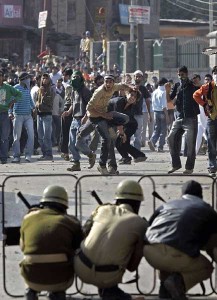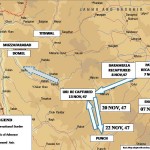In his message of February 12, 2007, Ayman al-Zawahiri, the No.2 to Osama bin Laden, has spoken of a global Jihadi Intifada. Has he spoken of any special areas of focus for this Intifada?
Whenever he talks of a global jihad or now of a global Jihadi Intifada, Zawahiri makes it clear that this has to cover all lands in the world, which rightfully belong to Islam. After saying so, he specifies certain areas, which he thinks should receive special attention first. Of these, he gives the topmost priority to Afghanistan and Iraq. He says the future of Islam and of the global Intifada itself will be decided in those countries. If they can defeat the Americans there, the jihadis’ victory in the rest of the lands will be assured.
The root cause is the growing perception among some sections of the youth that the security forces have been insensitive in performing their counter-insurgency duties and have been adopting objectionable methods ( e.g alleged false encounters) and using disproportionate force against the people.
After mentioning these two countries, he mentions certain other areas specifically. He believes that the victory of the jihadis in these areas would also be crucial for the ultimate victory of Islam. These areas are Palestine, including Gaza, the Lebanon, Somalia, Algeria and Chechnya in Russia. He describes Somalia as the Southern garrison of Islam and Algeria as its Western garrison.
What does he mean by Jihadi Intifada?
A kind of struggle in which the role of motivated individual Muslims will become more important than that of organisations so that the weakening or collapse of an organisation does not result in a collapse of the Intifada. He wants the Intifada to acquire a momentum of its own as a result of the sacrifices of individual Muslims…… The importance of a central command and control in keeping the Intifada going is down-played. The motivation of individual Muslims is more important than any centralised command and control. He also projects the Intifada as a mix of military and non-military struggles. He says in his message of December 20, 2006: “We must bear arms. And if we are unable to bear them, then we must support those who carry them. This support comes in many forms and guises, so we must exploit all Dawah, student and union activities to back the Jihadi resistance……. The Muslim Ummah must exploit all methods of popular protest, like demonstrations, sit-ins, strikes, refusing to pay taxes, preventing cooperation with the security forces, refusing to provide the Crusaders with fuel, hitting traders who supply the Crusader forces, boycotting Crusader and Jewish products, and other ways of popular protest.”
 What we are witnessing in certain areas of Jammu & Kashmir (J&K) is the beginning of an intifada of Zawahiri’s conception as propounded by him in his messages of February 12,2007,and earlier addressed to the Muslims of the world. One does not know whether Al Qaeda has had any role in the current violence in J&K, but its idea that the time had come to transform the jihad characterised by acts of terrorism into an intifada on a global scale characterised by leaderless street violence and the technique of a mix of military and non-military struggles has had some impact on the thinking and behaviour of some sections of the Kashmiri youth.We are confronted with a situation marked by leaders without followers and followers without leaders. The traditional political leaders of J&K have no influence over the agitating youth. The agitating youth have no identifiable leaders to whom an approach can be made by the Government for bringing down the violence. Whatever be the extent of the Pakistani role in instigating the violence, it has acquired a momentum of its own unrelated to Pakistan. Islamabad has been exploiting the violence, but does not seem to be the originator of it.
What we are witnessing in certain areas of Jammu & Kashmir (J&K) is the beginning of an intifada of Zawahiri’s conception as propounded by him in his messages of February 12,2007,and earlier addressed to the Muslims of the world. One does not know whether Al Qaeda has had any role in the current violence in J&K, but its idea that the time had come to transform the jihad characterised by acts of terrorism into an intifada on a global scale characterised by leaderless street violence and the technique of a mix of military and non-military struggles has had some impact on the thinking and behaviour of some sections of the Kashmiri youth.We are confronted with a situation marked by leaders without followers and followers without leaders. The traditional political leaders of J&K have no influence over the agitating youth. The agitating youth have no identifiable leaders to whom an approach can be made by the Government for bringing down the violence. Whatever be the extent of the Pakistani role in instigating the violence, it has acquired a momentum of its own unrelated to Pakistan. Islamabad has been exploiting the violence, but does not seem to be the originator of it.




